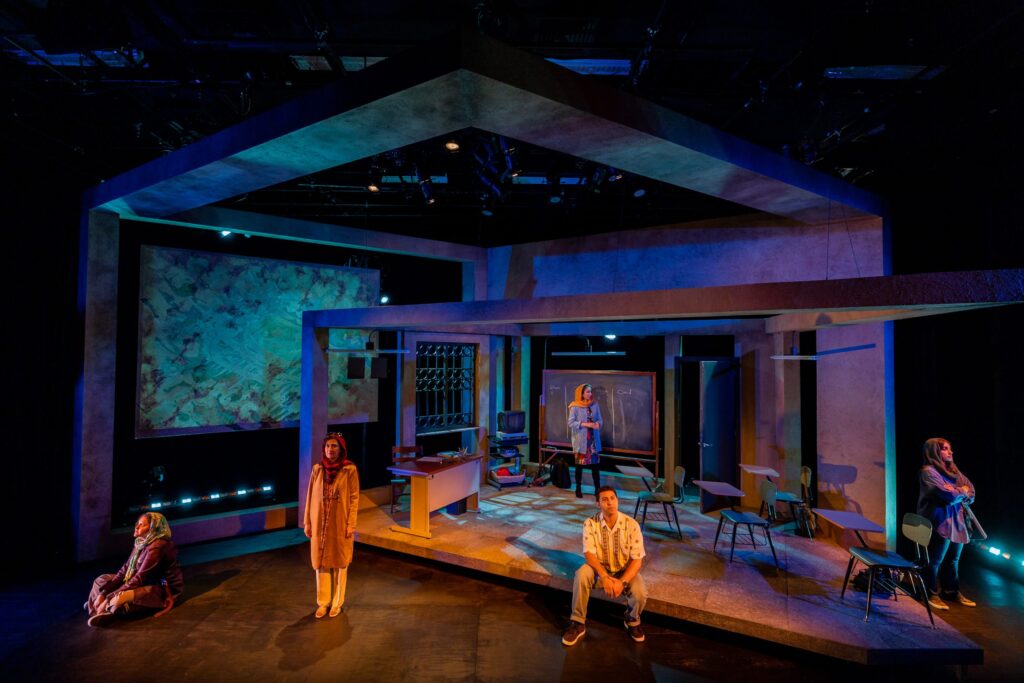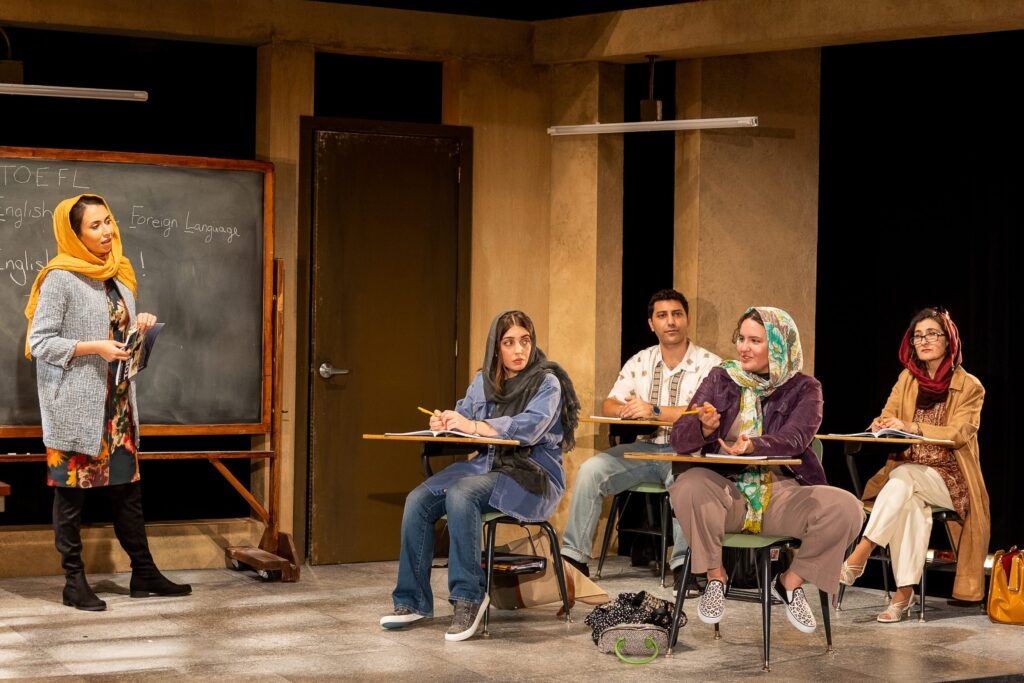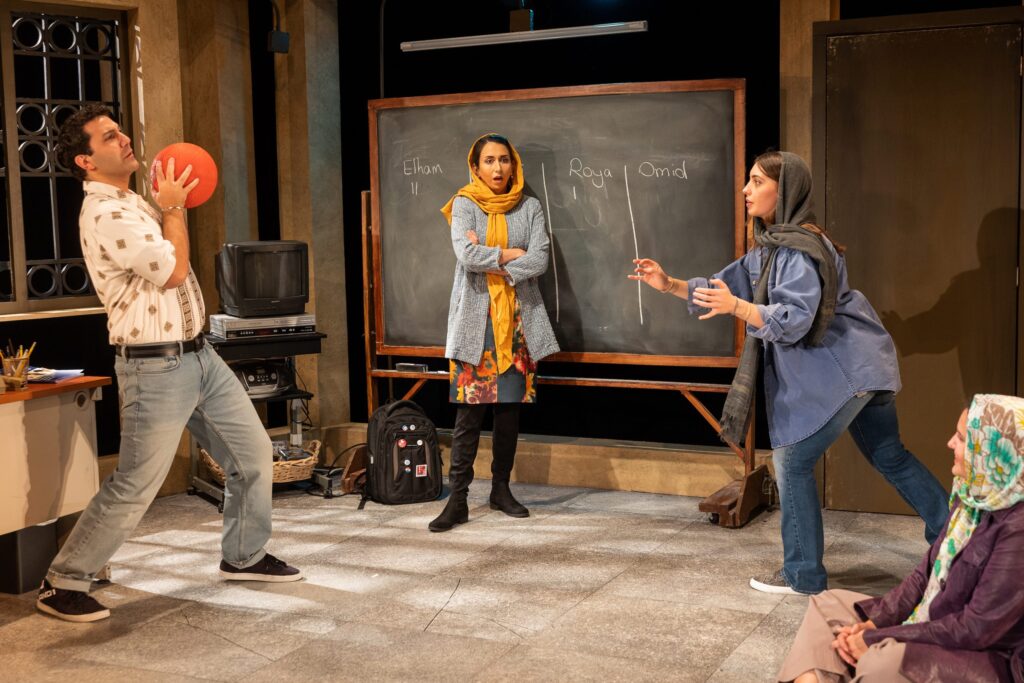
‘English’ –Sanaz Toossi, Playwright. Melory Mirashrafi, Director. Janie E. Howland, Scenic Designer. Nina Vartanian, Costume Designer. Amanda E. Fallon, Lighting Designer. Ash, Sound Designer. Emme Shaw, Props Designer. Presented by Speakeasy Stage at the Roberts Studio Theatre, Calderwood Pavilion, Boston Center for the Arts, 527 Tremont St. Boston, through November 19, 2022.
by Linda Chin
Like the four friends we recently met in Will Arbery’s Heroes of the Fourth Turning, Speakeasy’s English, by Sanaz Toossi, also centers on four classmates having “big conversations” that make their brains hurt. ‘Splitting’ headaches emerge when difficult subject matter is discussed amongst people ‘split’ along ideological lines, by an age/generational gulf, or by language barriers that inhibit communication.
In Heroes, we (presumably predominantly progressive audience members) are eavesdroppers at a gathering in Wyoming where young conservative Catholics are having a lively discussion about politics, religion, and the tumultuous state of the nation. In English we (presumably proficient English speakers) are flies on the walls of a classroom in Iran where adult English language learners are preparing for the TOEFL: Test of English as a Foreign Language. The students could have big discussions – about politics, religion, and the tumultuous state of their nation – with ease in Farsi, but in English they engage in small talk about singers they enjoy, or their favorite color. Arbery and Toossi give us access to worlds that they know very well but where few of us have traveled, and a lens into the lives of “foreigners” who are rarely represented on American theater stages. In tandem, the plays succeed in fostering cross-cultural understanding, reminding us that the desire to freely express one’s true self, to belong, and be understood is universal.
In the Roberts Studio Theatre, scenic designer Janie E. Howland has created an elegant, sculptural set that transports us to the world of English: It’s 2008 in Karaj, Iran, in a classroom with a whiteboard, TV, and a desk on which a boombox sits. The classroom is an ‘open-air’ structure – large beams with light-colored textured surfaces that frame, but do not enclose, the walls and roof. The floors and a single (working) door show signs of wear. An ornate metal window gate in the back of the classroom and a large abstract artwork on an ‘outside’ wall are odes to Iranian art and architecture. Lighting by Amanda E. Fallon subtly adds color, warm but not overpowering, to the neutral palette. The room feels welcoming.

Teacher Marjan (Deniz Khateri) tries to create a classroom culture that is friendly and safe. She wants her students to feel comfortable asking questions, to make mistakes without feeling ashamed, and to support each other’s progress. She wants her students to succeed, and encourages them to train their ears by listening to spoken English in films. Khateri, and her students Josephine Moshiri Elwood (Elham), Lily Gilan James (Goli), Leyla Modirzadeh (Roya), and Zaven Ovian (Omid), animate the space with their bright, expressive personalities, and with sharp direction by Melory Mirashrafi, deliver wonderful performances across the board.
Billed as a comedy, the laughs (thankfully) don’t come when the characters fumble their words or speak in heavily accented English (I attribute this to the presumably predominantly progressive audience, but expect the play might play differently in different locales). Marjan incorporates show and tell, word games and physical activities into her teaching methods that seem more befitting to a preschool classroom, and for intelligent, articulate adults, this borders on the silly/absurd. To work on proper pronunciation, the group walks around the room in a circle repeating/acting out “W” words – Wicked Witch of the West, Willy Wonka, Wheels on the Bus – that are all taken from kid culture.
Another game (a cross between ‘hot potato’ and ‘categories’ that I played as a kid) involves standing in a circle and tossing around a large red bouncy ball. At each catch, you shout out a word that fits a given category (e.g. Things that are green – tree! apple! leaves! or items of clothing – shirt! jacket! tie! windbreaker); hesitation or repeats get you removed from the circle until a winner remains. Learning English is not all fun and games, and in the classroom things can go from fun to fierce: Elham questions how Omid knows words as advanced as “windbreaker”, “spatula”, and “syllabus”; Omid calls Elham ‘Borat” as a joke, and in one round between Omid and Elham the friendly toss game deteriorates into an ultra-competitive, lightning-fast, high-stakes dodge ball-esque game.

Besides the physical comedy, Toossi has infused her script with witty exchanges that not only delight us, but reveal that her characters are multi-dimensional humans who like to laugh and make others laugh as much as anyone. Roya, the oldest student, uses her new iphone to leave countless VMs for her son: “Hello there I am Roya again. Red orange yellow green blue purple. Yes, okay thank you. Have a good one.” and (minutes later) “Hello there, I am Roya. I am here to tell you numbers. I know all the numbers now. Forty-three. Five hundred and thirty-eight. And. Seven.” to show him she can speak English to her new Canadian granddaughter Claire. Goli, at 18 the youngest student, starts week 2 off with a recitation: “I read now the words from Mary Has A Little Lamb,” that Marjan quickly jumps in to correct, “Had. Unfortunately.” In this and other moments, Marjan’s dry sense of humor comes through her serious demeanor. When Omid drops by during office hours, just when Marjan’s about to start watching a British rom-com, she says with a smile, “You’re welcome to watch it with me. Sometimes understanding Hugh Grant takes two people.”
Naturally, audience members’ responses to this play will vary, based on their own life experience. For me it was nostalgic, reminding me of the ESOL classes I taught in Boston’s Chinatown, or that my mom attended three evenings a week when I was growing up in Queens, NY. And all the characters were relatable. Roya’s story made me realize that I too am guilty of giving one of my daughters a name (Caroline) that her Cantonese-speaking grandmother would have difficulty pronouncing.
I heartily recommend that you go see this heartwarming production. And bring a friend. Sometimes understanding English takes two people. For tickets and information, go to: https://www.speakeasystage.com/

